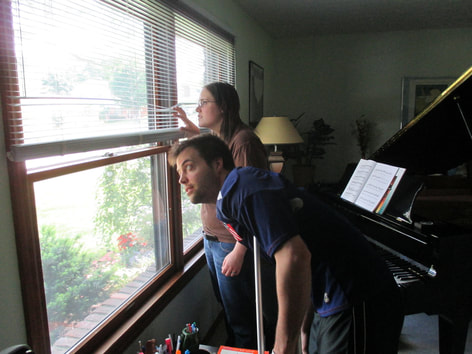|
Yesterday the Panera Posse got to discussing the Goasis ladies' room situation (see posts from 7/28, 7/29, and 7/30) and the topic of ladies' bathrooms in general.
We talked at length about ladies’ rooms, the best ones we'd ever been in, and the worst, which places around town had bathrooms we liked, the faults of the bathrooms we didn’t like. As our discussion progressed the thought hit me that what we had to say about this or that ladies' room was less interesting than the fact that we found it a discussion-worthy subject at all. Men don't talk about bathrooms. Most men don't even notice the state of a bathroom unless it's on beyond disgusting, and chances are they won't even notice it then. But women do notice, don’t we? When we’re out with other women in a restaurant or some other venue that we don’t generally frequent and one woman uses the bathroom, don't the rest of us invariably ask upon her return, “How was it?”? Don't women always have some comment, positive or negative, on every public bathroom we use? The thing is, for women, using a public bathroom really is different than it is for men. Maybe this is because there are situations in life in which women are more vulnerable than men; and in what situation are you more vulnerable than when going to the bathroom? I wonder if our strong feelings about bathrooms, then, are somehow rooted in instinct. An instinct for seeking safety and avoiding danger. Maybe for a woman a bathroom that looks unsavory could be setting off subconscious alarm bells that it could also be unsafe. So perhaps our collective desire for and willingness to wait for a big, well-maintained bathroom like the one at the Goasis where we can have maximum space and privacy behind a locked door is something for which we're genetically wired for our own safety. And in truth, while women in this country don't generally have to worry about our physical safety every time we make a trip to the bathroom, there are 3 billion women on this planet with no access to a private toilet for whom the situation is very different - and dangerous. To be continued..
2 Comments
Continued from yesterday...
Never mind. I'm not going to write to the Goasis after all. I no longer need to ask them what they were thinking when they built this big, wonderful travel stop along I-71 that has several restaurants, serves probably hundreds of people a day and has only 3 women's commodes. Because I now know the answer. My sister Romaine told me the answer in her comment yesterday. She wrote: "... much more cost effective to put in a few big bathrooms than one large one with 50 stalls. Less to clean and also a smaller water bill. Probably didn't care too much about the clientele, just the cost." Bingo! thought I. Yes, that makes perfect sense. They splurge on everything else and skimp on the ladies' bathroom. But here's the thing: they figured out the perfect scheme for not only getting away with it, but making most women (if the yelp reviews I read are an accurate indicator) love what they did! Now I can see the scene so clearly: The architects and executives sitting at their meeting trying to figure out how to cut expenditures. Somebody from marketing offers the idea that you could get away with only two regular women's stalls plus one handicapped if instead of stalls you built rooms and put a toilet and sink in each room, made the rooms big and attractive and clean and comfortable, nicer than what the customers have at home. Investing in upscale fixtures, mirrors, a couple pieces of furniture and some artwork would still cost only a fraction of what it would cost to build and maintain a conventional rest-stop bathroom with a dozen stalls. You could even make a cute little sitting area between the rooms. The ladies will love it and they'll gladly stand in line to use such a rest stop bathroom, says the man from marketing. And love it they do. Here are some of the comments from women from some Yelp reviews written between 2011 and 2014: "My husband and I joke that we could go on dates to the Goasis. It's really in a whole separate category from other gas stations. The bathrooms are awesome..." "Most notably, the bathrooms are remarkably nice for a rest stop off of the highway. Each stall has its own personal sink, and it almost looks like a bathroom you'd see inside someone's home. That nice. They're super clean, and absolutely nothing about it screams 'I'm a restroom off of the highway, use with caution!'" "Most amazing highway side bathrooms EVER." "Also, it officially wins Best Gas Station Bathroom Ever. I know it wasn't a hard award to win, but keep in mind it won by a ton." "The bathrooms are immaculate. I've gotten ready for a WEDDING in there." (Can you imagine hogging one of those three bathrooms long enough to get ready for a wedding?!) "I should also mention the bathrooms...the women's is ALL individual stalls, like little rooms, with a toilet, wash basin and towels, all in it. And the glass window on these is frosted, with like grass on it. Lovely." And on and on. The psychology being, I guess, that women would by far prefer waiting in line for a fancy bathroom over zipping in and out of the usual spartan rest-stop stall. So The Goasis saves a ton of money on bathroom expenses, the women love waiting in line for their upscale bathroom, and everybody's happy. Of course, there are always a few outliers, like the gal who wrote this review: "I usually love this rest stop... On this occasion, however, I changed my mind... My mom and I stopped here on 4th of July weekend on our way home from Dayton. I had to pee like crazy... I ran in to use the facilities and much to my dismay the line was out the door and around the corner. What I soon realized was that in this huge Goasis, there are only 3 stalls in the restroom. Each of those stalls, while lovely, large, roomy, and each having their own sink and paper towel roll, took up so much room that they only put in 3 in the whole place!!!!! Seriously, people, it is a REST-STOP not a palatial en-suite. Please put in more toilets... There was even a swanky circular seating area with an additional seat in the rest room...as if I'd sit & relax on my trip to the Goasis bathroom. Suggestion: don't stop here if you really have to go & it is a holiday weekend. You'll wait 20+ minutes to go." Amen, sister! But are this lady, Mary Jane (see her comment from Monday), Romaine and I the only outliers who would prefer a potentially sketchy but quick stall stop to a long wait for a luxurious bathroom experience? I don't know. Sisters, what do you think? But real quick, what about the Goasis men's room? I asked my sources, Tom and Tommy, and they each kind of shrugged. It's fine. Urinals and stalls. They didn't notice how many. Or what was on the walls. I guess guys are different from girls. Vive la difference, right!? ;) Continued from yesterday...
So Tommy, Claire, and I left the Goasis refreshed, rehydrated, snacked up, topped off and ready to roll on to Cleveland. When we were on the road again I told Tommy and Claire about the incident of the confused, distressed old lady who wanted to buck the ladies' room line and the impervious line leader who stood her ground. I told them how it all went down and asked for their input. Tommy, as expected, said that he, too, would have let the lady in need go to the head of the line. Claire, however, was more skeptical. Was it not possible, she wondered, that this person might just have been playing the pathetic little old lady card to avoid standing in line? I assured Claire that this old gal looked like the real deal, especially with her son (or whoever he was) helping her along, unless he was just a prop in the scheme to get her to the front of the bathroom line so they could get in and out and back on the road like everyone else wished they could do. But no, I assured Claire, I really didn't think this lady was scamming us, I thought she really was sending out an SOS. Claire then conceded that if that was truly the case then it probably would have been all right to let her cut in. Still, a couple comments on yesterday's blog, one from my brother Joe and one from my sister-in-law Mary Jane have given me pause. The gist of Joe's comment (in so many words, and as I understood it) was that I was just lucky that I wasn't the one who had to go really bad. This is true. Supposing I'd been in a desperate state myself? Would I then have been so generous with my spot in the line and so judgmental of the lady at the front of the line who wouldn't give up her spot? And by doing a solid (or maybe a liquid) for one lady might I not have been doing an injustice to another who, though equally desperate had played by the rules and done her time in line? Mary Jane's comment also provoked thought. She said that she, too had the same complaint about the Goasis, which I'm guessing her crew must hit when making the Cleveland-Columbus trek. She said she wondered what they were thinking when they designed it (meaning the bathroom area). Which got me to wondering the same thing: What were they thinking? I mean what were they actually thinking? I mean, when the architect was selling the Goasis design to the person who was having this super-deluxe travel stop built along a busy interstate, how exactly did he sell the business owner on the idea of installing only three ladies' commodes? Did he maybe say that women will be happy to wait to experience a big, fancy bathroom instead of a quickie stall? Did the business owner actually buy that? Well he must have. Did neither the architect nor the business owner know anything about the relationship between architecture and social engineering? That is, how the design of an edifice or public space can influence the behavior of the human beings who must make use of the edifice or space? I have half a mind to write to whoever owns the Goasis and ask them what it was that convinced them that three seats would be acceptable for an establishment that caters to probably 500 women a day. Actually I have three-quarters of a mind to do it. By dang, I'm going to do it! I'm going to write to the Goasis and seek to find out what they were thinking when they bought into this bathroom design, and if they have they have had any rude awakening on the error of their design. I'll keep you posted on what I find out. Most of Tom's side of the family lives in the Cleveland area, so over the years we've made manys the family trip from here to there. This past Saturday Claire flew in from Chicago and she, Tommy, and I travelled to Cleveland to visit the relatives. As of recent years any Columbus-to-Cleveland family trek must include the requisite stop at the Goasis, the creme de la creme among gas station/travel stops located on I-71 in Ashland. This trek was no exception. Because we all love the Goasis.  Why do we love the Goasis? Well, speaking for myself, there's something about that blue, green and yellow stylized flower that calls to me. And then there's the name "Goasis": An oasis when you're on the go. It's appealing. And the place is bright and colorful and clean and kind of pretty. In an upscale travel-stop way. Or, I don't know, maybe we all just really like stopping at that point along the route. The Goasis does, however, have one rather sizeable drawback: It has this gorgeous (by travel stop standards) restroom area that divides into two hallways with the mens' side running down one of the hallways, ladies' side down the other, with two family restrooms at the front end of the area. Gorgeous, yes; practical, no. I've never taken a peek at the men's side, but the ladies side is a hallway off which there are two spacious individual one-seater rooms, each room having its own sink, and one more even bigger handicapped room. Also off this hallway between two of the restrooms is a cozy little lounge area with red leather couches. It's all very clean and attractive. Except that they took an area where they could have fit a dozen stalls and instead built three big fancy rooms and a lounge area that nobody's going to lounge around in because we're all in a hurry to get back to our trips. So the line for these three ladies rooms always snakes down the hallway and sometimes around the corner. And though the family restrooms are also considered fair game, they're usually filled, too, but then once you're in line for the other three restrooms you can't know whether the family rooms are vacant or not because they are located at the front end of the area. Anyway, the ramifications of this drawback came into play last Saturday when we'd made our ritual stop and I was standing in line waiting my turn to use one of the fancy bathrooms. I'd been waiting a while - everybody had been - and when I was finally second in line a stylishly-dressed but slightly confused-looking older lady - maybe in her 70's - wandered to the front of the line and asked no one in particular if she could use one of these bathrooms. I thought she sounded a bit distressed, like she really had to go. That's another thing about the Goasis: if you really have to go you could be SOL* if the line's as long as it usually is and nobody's in the mood to let you cut in front. Now me, if I'd have been first in line I'd have let the lady cut in front of me, though I know that technically just because you're the first in line doesn't mean you have the right to let someone cut in front of you because they're also cutting in front of every body else. But I always figure tough tamales, I'll let anybody cut in front of me who I feel like letting cut in. That's just the way I roll. However the lady who was in front of me and first in line, a tight-elbowed middle-aged-type, was not of the same mindset. "These rooms are all full," she snapped at the old lady, "You need to go to the back of the line." The old lady and I both turned around to look at the line. It was about ten ladies long. The old lady now looked more distressed and confused. She hesitated a moment then shuffled away past the end of the line then around the corner and out of sight. A moment later two bathroom doors opened at once and the lady at the front went into one of the rooms while I turned around to rest of the line-waiters and declared in the most authoritative voice I could muster, "wait a second, I'll be right back!" I ran down the line and around the corner and found the old lady standing outside the family restrooms with a younger man who looked like her son. "Come on," I cried to her, "you can go ahead of me right now, hurry!" I didn't know how for long the line would honor my spot. Maybe the person behind me had already rushed into the open room in my place. The lady's son (or whoever he was) took her arm and began hurrying her after me, but just at that moment one of the family restrooms opened and so he hurried her into that one instead, thanking me anyway. I dashed like a madwoman back to the front of the line to find that my linemates had, in fact, waited for me and so I was not fated to start all over again at the end of the line. The moral of the story is that people can be good after all, right? *SOL: In polite circles I've heard this acronym stand for "Sure Out of Luck" and "Sorry Out of Luck". In less polite circles it stands for another "S" word Out of Luck. ;) A couple of days ago I talked about a movie I once saw called "Happy-Go-Lucky" about a woman who was, well, happy-go-lucky. I didn't like the movie the first time I saw it. I Kept waiting for something to happen, for some plot to start thickening, some dilemma to start brewing, but it was just scenes of a chirpy, chatty, jokey young woman going about her fairly mundane life: teaching her kindergarten class, going out drinking with her friends, taking driving lessons with a weird, angry driving instructor, coping with her problems.
But as I mentioned earlier, though upon first viewing the film seemed plotless and pointless, I kept thinking about the character's capacity for happiness until I decided to try for myself adopting an exclusively optimistic outlook on life. Looking on the bright side all the time. Always accentuating the positive and eliminating the negative. Not that I wasn't already fairly adept at putting on a happy face as needed - as most of us are - we all need to from time to time, right? But I really honed my skill at forcing a cheerful disposition back about 20 years ago when I used to work as a substitute music teacher at my children's elementary school. I hated music subbing. I hated getting that phone call at 6 am then having to jump out of bed and rush around, roam through the sweats and jeans in my closet searching for something teacher-acceptable to wear, put on hose and real shoes, fix my hair, hustle the kids together and out the door earlier than usual. But mostly I hated having to be teacher for a day. Of course I knew how to teach piano students one on one, but I didn't have a teaching degree and though I like children individually I truly hadn't the foggiest idea what to do with a class room full of them. So why did I sub for years if I hated it so much? It wasn't for the money. The truth is, I kept subbing because they kept asking me to and I would have felt guilty not helping out my children's school. It might not even have been so bad if the music teachers ever left lessons plans that I could make any sense out of. But they almost never did. (One time a teacher called me the night before to sub for her and told me she was teaching a unit on Gregorian Chant and that all the materials were on her desk. When I arrived in her classroom the next day there was a three-inch text book on Gregorian Chant sitting on her desk. That was all. That was a fun day. Not!). So anyway, I'd always be standing at the front of the music class room at 7:45 AM waiting with a heart full of anxious dread for the first group of children to arrive. However.. I got into the habit of beginning every class by pulling up the biggest honking smile I could fit across my face and telling the students how glad I was to be there, how good it was to see them again, how happy I was when I got the phone call this morning that I'd be subbing, how excited I was to have a reason to get dressed up, how much I enjoyed teaching them. Though the students didn't realize it, my welcome speech to them was my pep-talk to myself, and saying it helped me believe it a little, or at least act as if I believed it. Anyway, my little faux-happy speech always made me feel better. And friendlier. And I think it made the kids feel well-disposed towards me. Which made for a better day for us all. But those substitute teaching days of long ago were just occasional 6-hour forays into intentional happiness. It wasn't until I saw "Happy-Go-Lucky" that I decided to make the effort to be a full-time happy person. I don't remember how long I kept up the effort - it was back in 2008, so it's been a while - but as I recall, thinking more optimistically did help me feel more optimistic about life in general. at least for a while. But then again, making myself be happy all the time took effort and concentration and eventually I slacked off. Actually I think I was only able to keep it up solid for a couple of days. I think I just have a hard time focusing on anything for extended periods. But now I'm thinking maybe I should have tried a little harder for a little longer because I just read this comment of Romaine's on Wednesday's post: "From my classes I've read about how neurons re-wire through repetition - and that "fake it till you make it" can actually help your neurons re-wire to the point where you don't have to fake it any more." Which backs up something our pastor Kai Nilsen once said during a sermon: "You become what you habitually do." I definitely have to back and watch that movie again. I met with the Panera Posse yesterday.
One of the girls who used to teach at a school school in a poor section of the city was telling the rest of us about a student she once had, a 13-year-old boy, who told her that he didn't expect to live past 16. He told her that he often heard gun shots from his house and that one night while he was out in his neighborhood there was a shoot-out going on around him. He jumped into a trash can for cover. After she told us that story our conversation moved around to a few different topics until it landed on another story the same lady once heard, an Oprah interview with Lionel Richie in which he talked about how being rich and famous can be lethal because you can then have whatever you want, and you don't have to settle for just some of it, you can have all of it. All the drugs. All the alcohol. All the time. He said that having it all can kill you - several of his friends were dead from overdoses of drugs or alcohol because they couldn't handle their success - and he felt very fortunate that he survived. I then wondered if the moral to be derived from both those stories was that a life of extreme wealth and success is as perilous as a life of extreme dead-end poverty? One of the other ladies recalled a magazine article she'd read which claimed that in the United States having an income of $75,000 put people at a comfort level at which they could have enough of what they wanted and needed to be materially happy, and earning above that amount didn't increase people's level of emotional happiness. On the other hand, being financially insecure could lead to hardship and stress and therefore diminnish happiness. I frankly found the $75,000 number to be a little sketchy, especially since the article didn't take into account geographic location and how many people were living off the $75,000. But though the dollar figure might be debatable, I understand the concept: having enough money for the essentials and a little left over for some fun now and then is all you need. And, of course, love. Continued from yesterday...
So anyway, my mother has always been happy-go-lucky. And it's not because she hasn't had her share of hard times and unhappiness. In fact she's probably had more than her share, and yet she always manages to slide back to the happy end of the scale. She's always had tons of interests, tons of friends, and even at 94 still knows how to connect with people. My mother is an outgoing, optimistic woman who puts on a happy face and enjoys life. Like me. Sometimes. My father, on the other hand, was anti-social. Though he was a brilliant man with many solitary interests, classical music, art, military history and gourmet baking among them, he didn't relate to people on a personal level and had no real friendships. He taught medicine at Thomas Jefferson University Medical School in Philadelphia and the University of Pennsylvania, he wrote books on endocrinology, lectured across the United States , and was one of the top thyroid specialists in the country, though sometimes even people from other countries came to him for treatment. In fact we used to have a beautiful painting hanging in our living room of two Siamese fighting fish given to my father as a gift from some distinguished person from Thailand. (Romaine, isn't that awesome picture hanging in your dining room now?) And there's a life-sized portrait of my father still hanging in in the hallway at Thomas Jefferson Medical School for his contribution to his field. And though he loved his work and was greatly loved in return by his patients, students and colleagues, outside his work he was a loner and an introvert who I'm guessing had a great capacity for unhappiness. Like me. Sometimes. I think it's my father's aloofness in me that keeps me from being steeped in the warm sea of nurturing friendships that makes my mother the happy, connected person she is. And I think it's my mother's capacity for joy in me that keeps me from sinking, disconnected, into my father's dark pool of emotional isolation. But I wonder? Am I really a positive person at heart who just has to push through some rogue layers? Or am I really a negative person who's particularly strong at resisting the gloom and finding the light? Or neither of the above? I once saw a movie called "Happy Go Lucky". It was about a young woman who was always happy no matter what happened to her, sometimes to the point where she could drive other people crazy. My initial impression of this movie was that it was kind of lame - I mean, a whole movie of scene after scene of this lady who's never unhappy, no matter what happens to her? What was the point? But then the more I thought about it, the more intrigued I became of the idea of always being happy, no matter what. I decided to try it. To make myself be happy, no matter what was going on in my world. And it worked. For a while. Until I came to the realization that unlike me, the woman in the movie had no children, and though she herself suffered some misfortune, there were no scenes of her having to endure the pain of someone she dearly loved. On the other hand, the character in the movie did tend to make life's lemons into lemonade. Which is, I think, is the modus operandi of those fortunates who have a high happiness score and a low unhappiness score on the Positive Affectivity and Negative Affectivity Schedule test. (See yesterday's post). I think I'm going to go back and watch that movie again. And get out my lemon squeezer. There was another thought-provoking op-ed piece in last Sunday's New York Times. It was titled, "Love People, Not Pleasure" by Arthur C. Brooks. Here's the link if you'd like to check it out:
http://www.nytimes.com/2014/07/20/opinion/sunday/arthur-c-brooks-love-people-not-pleasure.html?_r=0 The main message of the article is in its title: That people find happiness in loving relationships with others. I think we can probably all attest to that. What doesn't bring happiness, according to the article, is the acquisition of: 1. fame; 2. wealth; or 3. tons of sex with many different partners. I can't personally attest to that, as I've never had any of those things. But, while the development of the message in Mr. Brooks piece was both enlightening and uplifting, what I found most illuminating was his mention of a certain psychological test used to determine both happiness and unhappiness in people. The name of this test is the Positive Affectivity and Negative Affectivity Schedule test. What this test has confirmed, according to Mr. Brooks, is that unhappiness is not just the absence of happiness and the the two are not opposites. They're just different brain activities. He writes: "Strange as it seems, being happier than average doesn't mean that one can't also be unhappier than average...So when people say, 'I am an unhappy person' they are really doing sums, whether they realize it or not. They are saying, 'My unhappiness is x, my happiness is y, and x>y'. The real questions are why, and what you can do to make y>x." Brooks took the test himself and found that he was at the top of the happiness range. But he also got a high score of unhappiness, as well. He calls himself "a cheerful melancholic". I totally got what he was saying. I felt like he was describing me. I, too, am a cheerful melancholic. Or am I a melancholy cheerful person? Or is it that whatever I feel, I just feel it greatly? Are we all that way? I imagine each of us with an internal sliding scale with "unhappy" at one end and "happy" at the other. Our disposition is always somewhere along the scale, sometimes moving more in one direction, sometimes more in the other. Sometimes, due to circumstances good or bad, it can get stuck in one spot for a while. But what about someone who's always at the "happy" end? Or always at the "unhappy" end? And what would you get if you crossed a perpetually happy camper, like my mother, with a chronic melancholic, like my father? You'd get me. To be continued tomorrow... Do you remember the frightened little mama bird who built her nest in the flowerpot on our front porch? (See the posts for 6/19, 6/20 and 6/23)  Who, in spite us humans who were constantly coming and going and scaring her out of her nest and into the neighboring trees,  and our cat, who was often waiting in ambush beneath her nest, always found the courage to come back from the safety of the trees to her nest to care for her eggs? I took the above photo about a month ago, and since then I've continued to pull a folding chair out onto the front porch about once a week and stand on the chair (which wasn't high enough to let me see into the nest), poise my camera over the nest and snap a photo, enabling me to see an image of what was going on in the nest . One time after I took a photo this is what I saw: At first I thought that one of the eggs had hatched and the baby died. I thought maybe it was because we'd scared the mother too much for her to stay in the nest and care for her eggs as they needed to be cared for. But then Tom reminded me that there were only two eggs in the nest, not three. He told me that mother birds sometimes bring little bits of things into the nest. Maybe to help keep the eggs warm. Or maybe mother birds like to fix up their new baby's room just like we human mothers do. Then around ten days ago my camera captured this: It was a little moment of joy. Our mama bird's eggs had hatched and her babies were alive and thriving in their little flowerpot nest. But now we had to worry about our cat and two other cats whom our cat had obviously befriended, as they were often sitting on our front porch near our cat. I think perhaps our cat had invited them over with the promise of a nice birdie dinner. The cats must have known that around two weeks after they've hatched, if the baby birds won't leave on their own the mama bird will nudge them out of the nest. Sometimes the young birds can't spread their wings and fly on the first try and they fall to the ground. And so we worried about this happening probably as much as our cat hoped it would. But what could we do? Fish gotta swim and birds gotta fly, but if a bird can't fly then a cat's gotta do what a cat's gotta do. We decided to let nature take its course. But we kept an eye on the cat and on the area under the flowerpot for signs of a little fallen bird. Just as we'd been pulling for their mother, we wanted those baby birds to make it. Four days ago I stood on the chair again with my camera over the flowerpot and snapped this: The babies and their brave little mother had made it.* I hope they find a kind world out there.
*The beautiful mosaic around the edge of the nest is birdie doo. I'd never thought to wonder about where birds go potty while they're in their nest, did you? But now we all know! 8) Continued from yesterday...
So Tom and I swept confidently into the into the Sears appliance department practically giddy with our secret knowledge that the dishwashers in the mid-price range were every bit as good as the high-priced ones. We tried to act very non-chalant as we looked over all the models, as if we were naive consumers who thought that one model might have an advantange over another, all the time knowing that all dishwashers were the same, that we could just pick any old model that had a sprayer attached to its top. We even mosied on over to the top-of-the-line models, the Bosch's and Samsungs and GE's, opened their heavy stainless-steel doors and examined their fancy racks and fold-down shelves and dozen buttons, scrutinizing them as if we'd consider shelling out $1,100 for one of these tiny-motored snobs and pitying the poor naifs who would. Little did I know how my arrogance would come back to bite me. Anyway, we settled on a modest, sensible Kenmore in black with the requisite upper sprayer and an Energy Star rating which, according to the energy guide tag it sported, "meets or exceeds the Government of Canada's high efficiency levels." Government of Canada's? Oh well, I guess Canada must be setting the standards these days. Whatever. Anyway, we figured if it's good enough for Canada it's good enough for us. At $329.99 (reduced from $399.99) our acquisition was the least expensive upper-sprayer model in the store. With the $40 coupon that my repairman gave us (reduced from $65 because our machine cost under $400), that brought the price down to $289.99. We were positively gleeful. Until the $139.99 deliver fee was tacked on. Then the $129.99 5-year warranty we grudgingly sprung for - I mean why should parts start breaking as soon as you buy the darn thing? But, oh well. Then there was $19.99 for the installation parts - now we have to pay for the installation parts?! And another $15 to have the installer haul away our defunct dishwasher - I mean, come on! Throw in the tax and we were up to a total of $584.72 But fine. We had our new dishwasher, even if we left the store grumping a little about all the added fees. Though by Monday morning our grumpiness had all worn off as we anticipated the arrival of our new mid-line-but-just-as-good-as-high-end dishwasher. I left for my yoga class while Tom stayed home to wait for its delivery. When I returned home from yoga, feeling refreshed in body and mind (though that feeling would be short lived) the dishwasher was there. I went over to take a look at it. I grabbed the handle, pressed the latch to open the door and pulled. The door wouldn't open. I pressed the latch harder and pulled again. The door didn't budge. "There's something wrong with the dishwasher door," I called to Tom. "The latch is stuck. In fact I can't even feel it" Tom came into the kitchen. "That's the top of the handle you're pressing. This door has no latch. You just pull it open." He grabbed the handle and gave it a good manly yank and the door opened. "Oh," said I, and tried just pulling the door open. I couldn't do it. "Pull harder," said Tom. I pulled harder. Finally I gave it a seriously hard yank, really throwing my back into it, and it sprung open. My elbow hurt. I shut the door again and tried opening it again. It took another hard back-yank to get it opened, Now my elbow hurt more. You know that sinking feeling you get when you've just spent a lot of money on something and it doesn't work right? Anyway, I called the number for the repair service and told them about the recalcitrant door on my new dishwasher. I asked them to send out someone to fix the door. They said they'd get back to me. A little while later the guy who installed the dishwasher called me back. "There's nothing wrong with the door," he said. "Those non-latch doors are just really hard to open. Really hard." "But it wasn't hard to open in the store," I wailed. "That's because that was a floor model," he said. "Probably been there for years and been opened and closed a million times. After a couple years yours might loosen up some, too." "But couldn't somebody come out and loosen it up for me?" I pleaded. "I mean, I can't open the thing without wrenching my arm!" "Nope, nothing anybody can do about it. Those latchless models are really hard to open." So I called Sears to tell them I wanted to exchange my dishwasher but the person who sold it to us wasn't there and I'd have to come into the store anyway to work out the exchange. Tom pointed out that we'd most likely have to pay another installation fee, buy another set of installation parts, pay another haul-away fee. And who knew if our $129.99 warranty was transferable? All of a sudden I was out of steam. I had things I needed to do. I didn't feel like going back to Sears. If they told me I had to pay another installation fee I'd say "forget it" and walk out of the store really ticked. I decided to say "forget it" now. I plopped down at my kitchen table and conjured up the image of my dishwasher guru as if he were in front of me sitting cross-legged on my kitchen floor. "Why," I sadly asked his spector, "in all your wisdom did you not take note of my boney hands and skinny arms and tell me to be sure to get a model with a latch?" Maybe I gave up up too easily, but rather than face a potential confrontation with Sears I surrendered to living with this latchless, arm-wrenching tyrant dishwasher. But if my dishwasher guru is correct in his prognosis on the life span of all appliances, I'll only have to live with it for 8 years. By which time I'll be 70. Have a great weekend anyway! 8) Epilogue: We've been running the machine on the energy-saving "smart wash" cycle. I cleans the dishes just fine. It's gonna be a long 8 years. |
"Tropical Depression"
by Patti Liszkay Buy it on Amazon: https://www.amazon.com/dp/B0BTPN7NYY "Equal And Opposite Reactions"
by Patti Liszkay Buy it on Amazon: http://amzn.to/2xvcgRa or from The Book Loft of German Village, Columbus, Ohio Or check it out at the Columbus Metropolitan Library
Archives
July 2024
I am a traveler just visiting this planet and reporting various and sundry observations,
hopefully of interest to my fellow travelers. Categories |
















 RSS Feed
RSS Feed